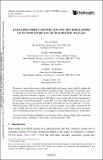Evaluating India's Climate Targets: The Implications of Economy-wide and Sector-Specific Policies
Author(s)
Winchester, Niven; Karplus, Valerie Jean
DownloadPublished version (994.2Kb)
Publisher with Creative Commons License
Publisher with Creative Commons License
Creative Commons Attribution
Terms of use
Metadata
Show full item recordAbstract
We employ a numerical economy-wide model of India with energy sector detail to evaluate the impact of achieving India's commitments to the Paris Climate Agreement. We simulate targets for reducing CO₂ emissions intensity of GDP via an economy-wide CO₂ price and for increasing non-fossil electricity capacity via a Renewable Portfolio Standard. We find that compared with the no policy scenario in 2030, the average cost per unit of emissions reduced is lowest under a CO₂ pricing regime. A pure RPS costs more than 10 times the cost of a CO₂ pricing regime. Projected electricity demand in 2030 decreases by 8% under the CO₂ price, while introducing an RPS further suppresses electricity demand. Importantly, a reduction in the costs of wind and solar power induced by favorable policies may result in cost convergence across instruments, paving the way for more aggressive decarbonization policies in the future.
Date issued
2019-07Department
Sloan School of Management; Massachusetts Institute of Technology. Joint Program on the Science & Policy of Global ChangeJournal
Climate Change Economics
Publisher
World Scientific Pub Co Pte Lt
Citation
Singh, Arun et al. “Evaluating India's Climate Targets: The Implications of Economy-wide and Sector-Specific Policies.” Climate Change Economics 10, 3 (July 2019): 1950009 © 2019 The Author(s)
Version: Final published version
ISSN
2010-0078